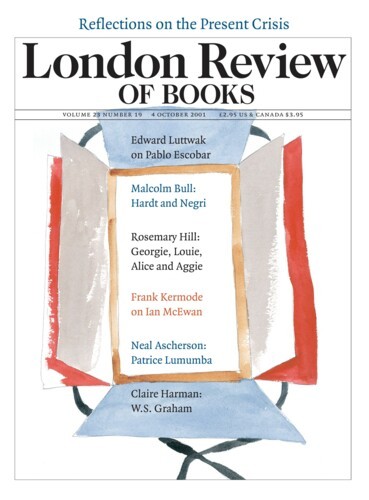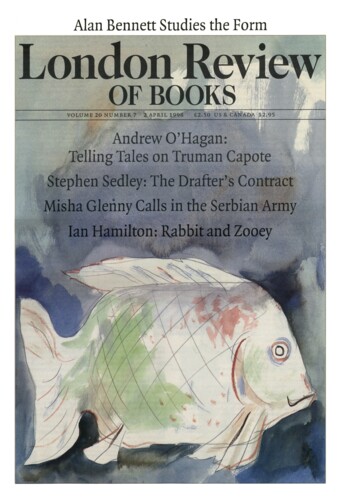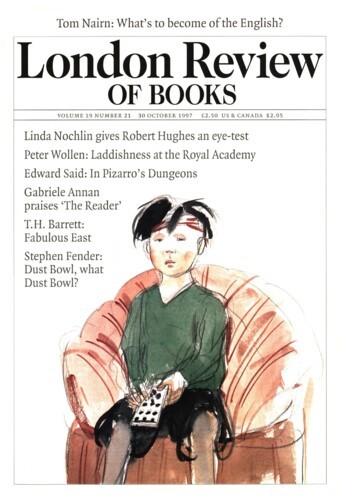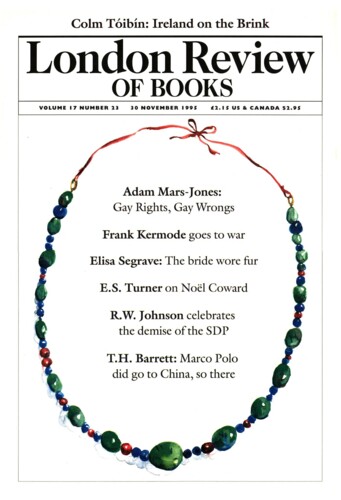T.H. Barrett
T.H. Barrett teaches in the Department of the Study of Religions at the School of Oriental and African Studies in London. He is the author of Taoism under the T’ang.
Close Relations: Tibet and the Dalai Lama
T.H. Barrett, 2 April 1998
If you can’t keep a good man down, it’s no wonder if that genuine rarity, a very good man, sometimes seems to be incessantly on the up and up. The Dalai Lama has already achieved cinematic immortality in Seven Years in Tibet, even though obliged to survive association with a slightly dodgy Austrian (but so did the UN), and has further film apotheoses in prospect, threatening to turn even Gandhi into an also-ran. Meanwhile, he makes a cameo appearance in Michael Dobbs’s new Good-fellowe thriller, which revolves around the hunt for his next incarnation in London. The Chinese villains are as dastardly as one might wish from HarperCollins, as sinister as the Manchu embassy officials who in 1896 kidnapped the obscure Chinese revolutionary Sun Yat-Sen in London and made him world famous, yet ultimately human enough for their allied Anglo-Tibetan opponents to outwit them. Thomas Goodfellowe MP, fictional hero as battered old teddy bear, is due for another outing this autumn, says the blurb. By then, where will our real-life hero, the Dalai Lama, be?
Sino-Jewish Relations
30 October 1997
Everything bar the Chopsticks
T.H. Barrett, 30 October 1997
In the middle of this century, a family tracing its descent from a friend of Marco Polo revealed in the journal Imago Mundi that it possessed ancient maps of Asia bearing annotation in Chinese which purported to derive from the great explorer himself. Unfortunately, that annotation, in a crabbed European imitation of a Chinese hand, includes a phrase corresponding exactly to our ‘terra incognita’, a label unknown to Chinese cartography. David Selbourne was probably unaware of these fakes when he embarked on his translation of the text he now entitles The City of Light, but it is worth pointing them out, just to make clear that the notion that Italian manuscripts concerning medieval Asian travel might be forged is not unthinkable. And there is no question that we shall have to class The City of Light as historical fiction, because it does not derive from a genuine source.‘
Wall? I saw no Wall
T.H. Barrett, 30 November 1995
If half a millennium of European expansion was inspired in no small part by a hoax, then surely we ought to know? But testing the veracity of Marco Polo today is not so easily done. The last British researcher into Marco Polo’s travels died in 1957, and the last historian of China who knew any Mongol left for America in the Eighties, at about the same time that the last British scholar who had learned Mongol as well as Chinese – the originally intended co-author of this book – decided that there were no career prospects for anyone with such skills and converted himself (very successfully) into a historian of Chinese art. That left two or three good historians who dealt with Marco Polo’s epoch in Asia, but largely from Middle Eastern sources, plus a handful of historians of China like myself who knew something of the issues, but generally avoided considering them unless compelled to do so. And with good reason: more than twenty-five years may have passed, but I distinctly remember how Frances Wood and I were warned that anyone contemplating working on the Mongol period in Chinese history would be issued with a bottle of aspirin, in view of the immense difficulties involved in studying an empire which employed in its administration not only classical Chinese (which we found hard enough) but also Mongol, Persian and Uighur Turkish.’
Read anywhere with the London Review of Books app, available now from the App Store for Apple devices, Google Play for Android devices and Amazon for your Kindle Fire.
Sign up to our newsletter
For highlights from the latest issue, our archive and the blog, as well as news, events and exclusive promotions.




